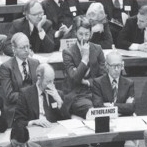De rol van de mensenrechten in het buitenlandse beleid van Nederland na 1945. Politicologische en historische literatuur
DOI:
https://doi.org/10.18352/bmgn-lchr.5833Keywords:
Human rights, History (historiography), Diplomatic relations, Foreign relationsAbstract
Y. Kleistra, Hollen of stilstaan. Beleidsverandering bij het Nederlandse ministerie van buitenlandse zaken P.R. Baehr, M.C. Castermans-Holleman, F. Grünfeld, Human rights in the foreign policy of the Netherlands E.M. van den Berg, The influence of domestic NGOs on Dutch human rights policy. Case studies on South Africa, Namibia, Indonesia and East Timor.
The role of human rights in post-1945 Dutch foreign policy: Politicological and historical literature, Maarten Kuitenbrouwer
The second Dutch government under Prime Minister Kok fell in 2002 following the publication of a critical report by the Dutch Institute for Wartime Documentation (NIOD) on the Srebenica issue. This event forms the starting point for a review of the recent literature on the role of human rights in Dutch foreign policy during the last few decades in both political science and history. Both disciplines share the 'decisionmaking analysis' in international relations theory as a common background. In addition, political scientists and historians have often found themselves researching the same human rights issues that affect Dutch relations with a series of non-Western countries. An explanation of Dutch policy is usually sought based on a combination of internal
and external factors. In general, comparative analyses and research into its effectiveness are still conspicuous by their absence. All in all, there are more similarities than differences between recent political and historical studies on the role of human rights in Dutch foreign policy.
Downloads

Downloads
Published
Issue
Section
License
Authors who publish with this journal agree to the following terms:
a) Authors retain copyright and grant the journal right of first publication with the work simultaneously licensed under a Creative Commons Attribution 4.0 International (CC BY 4.0) that allows others to share the work with an acknowledgement of the work's authorship and initial publication in this journal.
b) Authors are able to enter into separate, additional contractual arrangements for the non-exclusive distribution of the journal's published version of the work (e.g., post it to an institutional repository or publish it in a book), with an acknowledgement of its initial publication in this journal.
c) Authors are permitted to post their work online (e.g., in institutional repositories or on their website) prior to and during the submission process.
Authors are explicitly encouraged to deposit their published article in their institutional repository.








